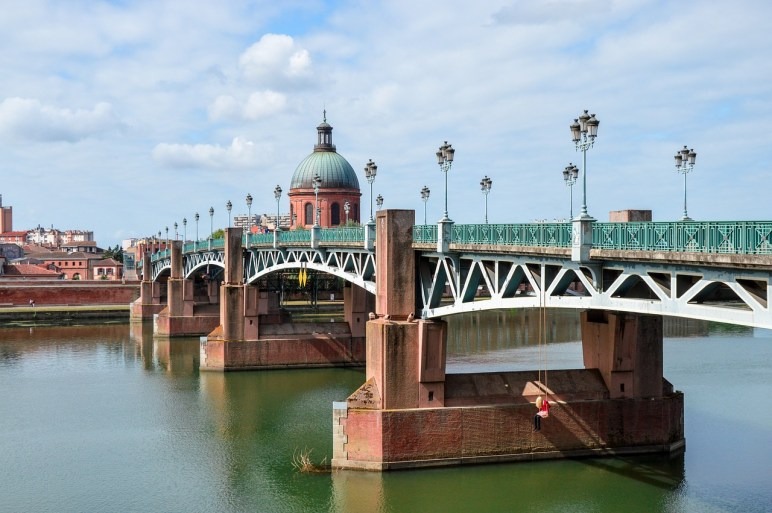Toulouse excels in music and cuisine!

The recently designated UNESCO City of Music in southwestern France boasts a blend of historic and innovative cultural spaces, complemented by exceptional regional cuisine.
From discarded items emerges rhythm, as scraps transform into melodies. At La Halle de la Machine in Toulouse, I observe Ignacio Herrero, a member of the La Halle team, crafting music from reclaimed pieces of refuse. While this spacious warehouse in the southern Montaudran district is renowned as the abode of the colossal animatronic Minotaur Asterion and its equally massive arachnid companion Ariane, the staff’s presentations extend to a makeshift orchestra. Old car horns metamorphose into an organ, abandoned guitars form a towering pinwheel, battered drum cymbals create a cascade, and an accordion is powered by a contraption that once operated windscreen wipers. The charm lies in the ingenuity, innovation, and whimsy on display — a delightful convergence of music and engineering that would have inspired Heath Robinson to burst into song.
Toulouse has a tradition of pushing boundaries: La Halle de la Machine is situated adjacent to the L’Envol des Pionniers Museum, dedicated to early French aviation, and merely three miles away from the space-themed Cité de l’Espace science museum. As of October 31, it holds the prestigious title of an official UNESCO-designated City of Music, acknowledging Toulouse’s outstanding musical institutions, music education, and vibrant festivals.
Music is ingrained in the city’s essence, echoing the era when Toulouse’s medieval counts fervently supported Occitan-singing troubadours, shaping the soundtrack of the Middle Ages. Rarely does a city hall coexist with a national theater and opera house, exemplified by the Théâtre du Capitole behind the pink neoclassical facade—the most imposing landmark in Toulouse. During my visit, the Christmas market animates the elegant arcades of Place du Capitole with dazzling white wooden chalets, the aroma of mulled wine, and stalls showcasing the irresistibly creamy aligot, the signature dish of the Aveyron region, known for its cheesy, garlicky mash.
I attend a mesmerizing rendition of Monteverdi’s The Return of Ulysses by the Toulouse-based Gemelliensemble at the Théâtre du Capitole. Although it marks the conclusion of the series, it offers a glimpse into the theater’s diverse program encompassing opera, classical music, and ballet. With the echoes of baroque opera still resonating, I meander towards the student quarter near one of Toulouse’s three universities. The gothic Couvent des Jacobins, with its cloisters, provides an atmospheric venue for concerts, including the Piano aux Jacobins festival. Nearby, Toulouse’s conservatoire is diligently shaping the future generation of musicians.

As I arrive at Place Saint-Pierre, situated by the Garonne River, I find myself in the heart of student territory. The reason behind the bar Le Saints des Seins dubbing itself the saint of breasts remains unclear, but it draws a crowd for its live music and DJ sets. Just a few minutes away, the Flashback Café offers a slightly more mature ambiance. Its DayGlo interior brings warmth to a chilly December night, featuring brightly colored inflatable sofas, a giant screen for gamers, and a stage for live bands and DJs. Regrettably, I won’t be present for its themed night of “ugly jumpers, moustaches, and mullet haircuts.” Time constraints also prevent me from venturing further along the river to Le Taquin jazz club, an intimate venue hosting local and international jazz musicians, as well as funk and world music artists.
Two of my preferred cultural establishments in Toulouse—the art collections housed within Fondation Bemberg and Musée des Augustins—are currently undergoing renovations. The former is set to reopen in February, while the latter is expected to welcome visitors again in late 2025.
During my stay, I chose one of Toulouse’s newest boutique hotels, the centrally located Hotel Les Capitouls. Stepping into the hotel’s reception, I was greeted by posters featuring iconic bands like Joy Division, New Order, the Stone Roses, and the Haçienda nightclub—a rare sight. The French designer, Thierry d’Istria, drew inspiration from the music scene of 1980s and 90s Manchester, transforming cassette tapes and other musical memorabilia into artworks adorning both the rooms and public spaces. Even the bar is named Le Wilson, though it’s likely a nod to the nearby Place Wilson rather than the renowned Manchester music figure, Tony Wilson.
A recent addition to Toulouse’s cultural and culinary landscape emerged in September within La Cartoucherie, an eco-district near the 11,000-capacity music venue Zénith Toulouse Métropole. Les Halles de la Cartoucherie arose from the remnants of a former munitions factory and has swiftly become a popular destination. Showcasing its industrial legacy, Les Halles combines elements of a food hall—with stalls offering a diverse range from cassoulet to West African cuisine, along with a butcher’s and food shop—a co-working space, and a fitness center featuring squash courts, a gym, and a climbing center. The facility also provides spaces for courses and workshops. Come spring, its state-of-the-art music venue is set to open for concerts and cultural performances.


